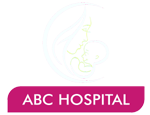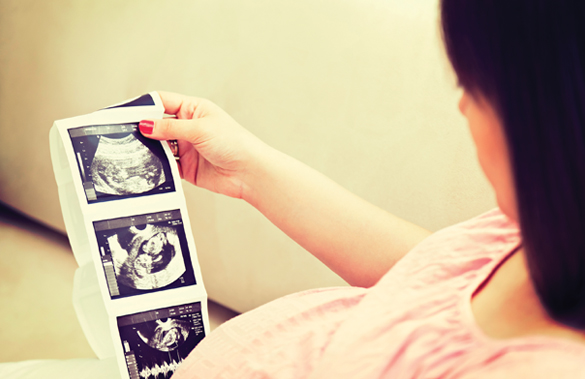


A general check-up before you conceive is always the best idea.Motherhood provides pre-conceptual counselling to ensure that you’re healthy as possible before you become pregnant.We will be with you from the start of your journey, advising you on your diet, healthy eating plan, an exercise regime & may suggest lifestyle changes including medical tests & ultrasound to eliminate any health risks.Under the guidance of our Specialists you can avoid complications if you seek advice earlier than later.
Preconception Counseling & Investigations enables you to learn about health issues and help to get treated before you conceive
At Motherhood, our experts guide you to make a healthy choice for you and your future baby with preconception health checks. So stay in the best of your health when you are planning to go the family way

The first scan is usually during your early pregnancy, around 6 – 9 weeks is called the ‘early pregnancy’ or the ‘dating’ or the ‘viability’ scan.
During an ultrasound your doctor or a skilled technician uses a plastic transducer to transmit high-frequency sound waves through your uterus. These sound waves send signals back to a machine that converts them into images of your baby.
Depending on your stage of pregnancy, scans can:
Your first ultrasound, also known as a sonogram, will take place when you’re around 6 to 8 weeks pregnant.At this stage, your baby is very small and your uterus and fallopian tubes are closer to your birth canal than to your abdomen, so your ob-gyn will conduct the test transvaginally to get a clearer picture.
This ultrasound, called an anatomy scan, lasts 20 to 45 minutes if you’re having one baby, longer if you’re having multiples. Your ob-gyn uses it to assess the baby’s growth and make sure all of her organs are developing properly.You’ll be able to see your baby’s developing body in great detail, but it can be hard for an untrained eye to distinguish the kidneys from the stomach. It’s an emotional experience to see your child up there on the TV screen.
For many pregnant women, their last ultrasound takes place at their 20-week anatomy scan. If you’ve gone past your due date, your doctor may want to keep a close eye on your baby with fetal heart-rate monitoring and ultrasounds to assess the amniotic fluid levels. Other reasons for third-trimester ultrasounds include concerns about the health of the placenta and questions about whether your baby’s growth is on track

Your Pregnancy Care – Leave it to us. Now that you know you’re pregnant, it’s more important than ever to take care of yourself both physically and emotionally. We will guide you through all stages of pregnancy to delivery and beyond making your miraculous journey happier and healthier for the baby and you.
Healthy eating during pregnancy is critical to your baby’s growth and development. In order to get the nutrients you need, you must eat from a variety of food groups, including fruits and vegetables, breads and grains, protein sources and dairy products.
Key pregnancy nutrition
A pregnant woman needs more calcium, folic acid, iron and protein than a woman who is not expecting. Here is why these four nutrients are important.
Folic acid, also known as folate when found in foods, is a B vitamin that is crucial in helping to prevent birth defects in the baby’s brain and spine, known as neural tube defects.
Before Conceiving – Women who are trying to have a baby is advised to take a daily vitamin supplement containing 400 micrograms of folic acid per day for at least one month before becoming pregnant.
During pregnancy – Increase the amount of folic acid to 600 micrograms a day, an amount commonly found in a daily prenatal vitamin.
Food sources: leafy green vegetables, fortified or enriched cereals, breads and pastas.
Calcium is a mineral used to build a baby’s bones and teeth. If a pregnant woman does not consume enough calcium, the mineral will be drawn from the mother’s stores in her bones and given to the baby to meet the extra demands of pregnancy, Many dairy products are also fortified with vitamin D, another nutrient that works with calcium to develop a baby’s bones and teeth.
Pregnant women ( 19 yrs and over) – Need 1,000 milligrams of calcium a day;
Pregnant teens (14yrs to 18yrs ) – Need 1,300 milligrams daily
Food sources: milk, yogurt, cheese, calcium-fortified juices and foods, sardines or salmon with bones, some leafy greens (kale, bok choy).
Iron: Pregnant women need 27 milligrams of iron a day, which is double the amount needed by women who are not expecting. Additional amounts of the mineral are needed to make more blood to supply the baby with oxygen.
Getting too little iron during pregnancy can lead to anemia, a condition resulting in fatigue and an increased risk of infections.
For better absorption of the mineral, include a good source of vitamin C at the same meal when eating iron-rich foods. For example, have a glass of orange juice at breakfast with an iron-fortified cereal.
Food sources: meat, poultry, fish, dried beans and peas, iron-fortified cereal.
Protein: More protein is needed during pregnancy, but most women don’t have problems getting enough of these foods in their diets,
Food sources: meat, poultry, fish, dried beans and peas, eggs, nuts, tofu.
Foods to eat
During pregnancy, the goal is to be eating nutritious foods most of the time, To maximize prenatal nutrition, we advice the following five food groups:
Pregnancy Do’s
See your doctor regularly – Prenatal care can help keep you and your baby healthy and spot problems if they occur.
Continue taking folic acid throughout your pregnancy – All women capable of pregnancy should get 400 to 800 micrograms (400 to 800 mcg or 0.4 to 0.8 mg) of folic acid every day. Getting enough folic acid lowers the risk of some birth defects. Taking a vitamin with folic acid will help you to be sure you are getting enough.
Eat a variety of healthy foods – Include fruits, vegetables, whole grains, calcium- rich foods, lean meats, and a variety of cooked seafood.
Get all essential nutrient – Including iron,every day. Getting enough iron prevents anemia, which is linked to preterm birth and low-birth weight babies. Ask your doctor about taking a daily prenatal vitamin or iron supplement.
Drink extra fluids, especially water.
Get moving! Unless your doctor tells you otherwise, physical activity is good for you and your baby.
Gain a healthy amount of weight – Gaining more than the recommended amount during pregnancy increases a woman’s risk for pregnancy complications. It also makes it harder to lose the extra pounds after childbirth.Check with your doctor to find out how much weight you should gain during pregnancy.
Wash hands, especially after handling raw meat or using the bathroom
Get enough sleep – Aim for 7 to 9 hours every night. Resting on your left side helps blood flow to you and your baby and prevents swelling. Using pillows between your legs and under your belly will help you get comfortable
Set limits – Don’t be afraid to say “no” to requests for your time and energy. Ask for help from others.
Make sure health problems are treated and kept under control – If you have diabetes, control your blood sugar levels. If you have high blood pressure, monitor it closely.
Ask Your Doctor Before Stopping any medicines you take or taking any new medicines – Prescription, over-the- counter, and herbal medicine, all can harm your baby.
Get a flu shot – Pregnant Women can get very sick from the flu and may need hospital care. Ask your doctor about the flu vaccine.
Always Wear Seat belt – The Lap Strap should go under your belly, across your hips. The shoulder strap should go between your breasts and to the side of your belly.
Join Childbirth Or Parenting Classes.
Pregnancy Don’ts
Don’t Smoke Tobacco – Quitting Is Hard, but you can do it! Ask your Doctor for help. Smoking during pregnancy passes nicotine and cancer-causing drugs to your baby. Smoking also keeps your baby from getting needed nourishment and raises the ris
k of miscarriage, preterm birth, and infant death. Avoid exposure to toxic substances and chemicals, such as cleaning solvents, lead and mercury, some insecticides, and paint. Pregnant women should avoid exposure to paint fumes.
Protect Yourself And Your Baby From Food- borne illness, which can cause serious health problems and even death. Handle, clean, cook, eat, and store food properly.
Don’t Drink Alcohol – There Is No Known safe amount of alcohol a woman can drink while pregnant. Both drinking every day and drinking a lot of alcohol once in awhile during pregnancy can harm the baby.
Don’t use illegal drugs – Tell your doctor if you are using drugs. Recreational Drugs are very dangerous for you and your baby.
Don’t clean or change a cat’s litter box – This could put you at risk for toxoplasmosis, an infection that can be very harmful to the fetus.
Don’t Eat Swordfish, king mackerel, shark, and tilefish, which are high in mercury.
Avoid contact with rodents and with their urine, droppings, or nesting material. This includes household pests and pet rodents, such as guinea pigs and hamsters. Rodents can carry a virus that can be harmful or even deadly to your unborn baby.
Don’t Take Very Hot Bath in hot tubs or saunas. High temperatures can be harmful to the fetus, or cause you to faint.
Don’t use scented feminine hygiene products. Pregnant women should avoid scented sprays, sanitary napkins, and bubble bath. These products might irritate your vaginal area, and increase your risk of a urinary tract infection or yeast infection.
Avoid X-Rays. If you must have dental work or diagnostic tests, tell your dentist or physician that you are pregnant so that extra care can be taken.

Healthy eating during pregnancy is critical to your baby’s growth and development. In order to get the nutrients you need, you must eat from a variety of food groups, including fruits and vegetables, breads and grains, protein sources and dairy products.
Key pregnancy nutrition
A pregnant woman needs more calcium, folic acid, iron and protein than a woman who is not expecting. Here is why these four nutrients are important.
Folic acid, also known as folate when found in foods, is a B vitamin that is crucial in helping to prevent birth defects in the baby’s brain and spine, known as neural tube defects.
Before Conceiving – Women who are trying to have a baby is advised to take a daily vitamin supplement containing 400 micrograms of folic acid per day for at least one month before becoming pregnant.
During pregnancy – Increase the amount of folic acid to 600 micrograms a day, an amount commonly found in a daily prenatal vitamin.
Food sources: leafy green vegetables, fortified or enriched cereals, breads and pastas.
Calcium is a mineral used to build a baby’s bones and teeth. If a pregnant woman does not consume enough calcium, the mineral will be drawn from the mother’s stores in her bones and given to the baby to meet the extra demands of pregnancy, Many dairy products are also fortified with vitamin D, another nutrient that works with calcium to develop a baby’s bones and teeth.
Pregnant women ( 19 yrs and over) – Need 1,000 milligrams of calcium a day;
Pregnant teens (14yrs to 18yrs ) – Need 1,300 milligrams daily
Food sources: milk, yogurt, cheese, calcium-fortified juices and foods, sardines or salmon with bones, some leafy greens (kale, bok choy).
Iron: Pregnant women need 27 milligrams of iron a day, which is double the amount needed by women who are not expecting. Additional amounts of the mineral are needed to make more blood to supply the baby with oxygen.
Getting too little iron during pregnancy can lead to anemia, a condition resulting in fatigue and an increased risk of infections.
For better absorption of the mineral, include a good source of vitamin C at the same meal when eating iron-rich foods. For example, have a glass of orange juice at breakfast with an iron-fortified cereal.
Food sources: meat, poultry, fish, dried beans and peas, iron-fortified cereal.
Protein: More protein is needed during pregnancy, but most women don’t have problems getting enough of these foods in their diets,
Food sources: meat, poultry, fish, dried beans and peas, eggs, nuts, tofu.
Foods to eat
During pregnancy, the goal is to be eating nutritious foods most of the time, To maximize prenatal nutrition, we advice the following five food groups:
Pregnancy Do’s
See your doctor regularly – Prenatal care can help keep you and your baby healthy and spot problems if they occur.
Continue taking folic acid throughout your pregnancy – All women capable of pregnancy should get 400 to 800 micrograms (400 to 800 mcg or 0.4 to 0.8 mg) of folic acid every day. Getting enough folic acid lowers the risk of some birth defects. Taking a vitamin with folic acid will help you to be sure you are getting enough.
Eat a variety of healthy foods – Include fruits, vegetables, whole grains, calcium- rich foods, lean meats, and a variety of cooked seafood.
Get all essential nutrient – Including iron,every day. Getting enough iron prevents anemia, which is linked to preterm birth and low-birth weight babies. Ask your doctor about taking a daily prenatal vitamin or iron supplement.
Drink extra fluids, especially water.
Get moving! Unless your doctor tells you otherwise, physical activity is good for you and your baby.
Gain a healthy amount of weight – Gaining more than the recommended amount during pregnancy increases a woman’s risk for pregnancy complications. It also makes it harder to lose the extra pounds after childbirth.Check with your doctor to find out how much weight you should gain during pregnancy.
Wash hands, especially after handling raw meat or using the bathroom
Get enough sleep – Aim for 7 to 9 hours every night. Resting on your left side helps blood flow to you and your baby and prevents swelling. Using pillows between your legs and under your belly will help you get comfortable
Set limits – Don’t be afraid to say “no” to requests for your time and energy. Ask for help from others.
Make sure health problems are treated and kept under control – If you have diabetes, control your blood sugar levels. If you have high blood pressure, monitor it closely.
Ask Your Doctor Before Stopping any medicines you take or taking any new medicines – Prescription, over-the- counter, and herbal medicine, all can harm your baby.
Get a flu shot – Pregnant Women can get very sick from the flu and may need hospital care. Ask your doctor about the flu vaccine.
Always Wear Seat belt – The Lap Strap should go under your belly, across your hips. The shoulder strap should go between your breasts and to the side of your belly.
Join Childbirth Or Parenting Classes.
Pregnancy Don’ts
Don’t Smoke Tobacco – Quitting Is Hard, but you can do it! Ask your Doctor for help. Smoking during pregnancy passes nicotine and cancer-causing drugs to your baby. Smoking also keeps your baby from getting needed nourishment and raises the ris
k of miscarriage, preterm birth, and infant death. Avoid exposure to toxic substances and chemicals, such as cleaning solvents, lead and mercury, some insecticides, and paint. Pregnant women should avoid exposure to paint fumes.
Protect Yourself And Your Baby From Food- borne illness, which can cause serious health problems and even death. Handle, clean, cook, eat, and store food properly.
Don’t Drink Alcohol – There Is No Known safe amount of alcohol a woman can drink while pregnant. Both drinking every day and drinking a lot of alcohol once in awhile during pregnancy can harm the baby.
Don’t use illegal drugs – Tell your doctor if you are using drugs. Recreational Drugs are very dangerous for you and your baby.
Don’t clean or change a cat’s litter box – This could put you at risk for toxoplasmosis, an infection that can be very harmful to the fetus.
Don’t Eat Swordfish, king mackerel, shark, and tilefish, which are high in mercury.
Avoid contact with rodents and with their urine, droppings, or nesting material. This includes household pests and pet rodents, such as guinea pigs and hamsters. Rodents can carry a virus that can be harmful or even deadly to your unborn baby.
Don’t Take Very Hot Bath in hot tubs or saunas. High temperatures can be harmful to the fetus, or cause you to faint.
Don’t use scented feminine hygiene products. Pregnant women should avoid scented sprays, sanitary napkins, and bubble bath. These products might irritate your vaginal area, and increase your risk of a urinary tract infection or yeast infection.
Avoid X-Rays. If you must have dental work or diagnostic tests, tell your dentist or physician that you are pregnant so that extra care can be taken.

From paediatric consultations to nutrition to advise on lactation, we help you welcome the baby into the world and pave the way for a healthy life for the young one. We also have world class NICU facilities to ensure your baby is taken care of incase there are any untoward complications or the baby is born premature.
Reasons to immunize your child
Many parents come up with excuses for delaying their child’s immunization (vaccination)or skipping it entirely. Some parents feel their babies are too young and delicate to receive strong vaccinations, some find it extremely difficult to see their child go through the procedure. Difficult as it may seem, if you are a parent it is important that you keep one important factor in mind. Without timely vaccinations, your child is extremely vulnerable to a host of diseases. Below, we mention some reasons as to why vaccinations are very important for a child and what happens when you do not keep up with the immunization schedule.
Getting vaccinated for rubella during pregnancy
Immunisation starts with you! If you are pregnant, you should be vaccinated for rubella. If you contract rubella in your first trimester, your baby is at risk of being born with congenital rubella syndrome (CRS) that causes developmental delays, deafness and heart defects.
Immunization protects others you care about
If you fear getting your child vaccinated because he/she might develop some allergic reaction or some other side effect to it, you might want to think again. Vaccines and their effects are carefully reviewed by scientists and medical professionals. If the vaccines are stored and administered in the rightful way, there is a very rare chance of occurrence of side effects due to vaccinations. In any case, the benefits of vaccinations significantly surpass the risks associated with it.
You can save time and money with timely immunization
Vaccine preventable diseases can cause prolonged or permanent disability in children and cause parents financial constraints, and also cause loss of work hours. The psychological side of seeing your child suffer with illnesses goes without saying. On the other hand, if you vaccinate your child, you can ensure your child remains safe from several preventable diseases.
You contribute to the good health of future generations
Some diseases that once claimed the lives of thousands of people around the world are now either eradicated or under control with the use of vaccines. For example, polio has been completely eradicated from the United States and many other countries.
In India too, the polio eradication initiative has shown remarkable results and its success will depend on the continued support of responsible parents like you. Disease prevention through vaccination can ensure your children grow up into healthy adults and protect future generations from being affected by those diseases.
Other reasons for getting your child vaccinated
Today most schools require a copy of the vaccination card during admissions to ensure there are no incidents of vaccine preventable diseases from spreading and hampering the school activities.
Diseases like chicken pox, measles, etc. can be contracted not just during childhood, but also during adulthood. So if you child comes in contact with the virus at some point of time later in life, he/she still remains vulnerable to the disease.
If you delay your child’s vaccination, you leave your child vulnerable to those diseases for that particular period of time.
Neonatal ICU
Every family hopes that their baby be born healthy and normal, but should your baby need specialized care, our team of expert neonatologists and neonatal nursing staff will provide it. The Neonatal Intensive Care Unit (NICU) at Motherhood is a level III unit. We offer the most advanced care for premature and critically ill newborns.
New parents eagerly look forward to bringing their baby home, so it can be frightening if your newborn needs to be admitted to the neonatal intensive care unit (NICU). At first it may seem like a foreign place, but understanding the NICU and what goes on there can help ease your fears and let you better help your baby.
Though the environment in the NICU can be intimidating, consider it as a special care nursery for your baby where our expert neonatologists and neonatal nursing staffs will familiarize you with it so you can participate in the care process.
